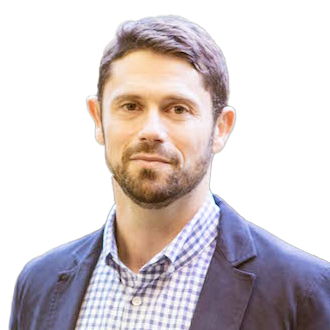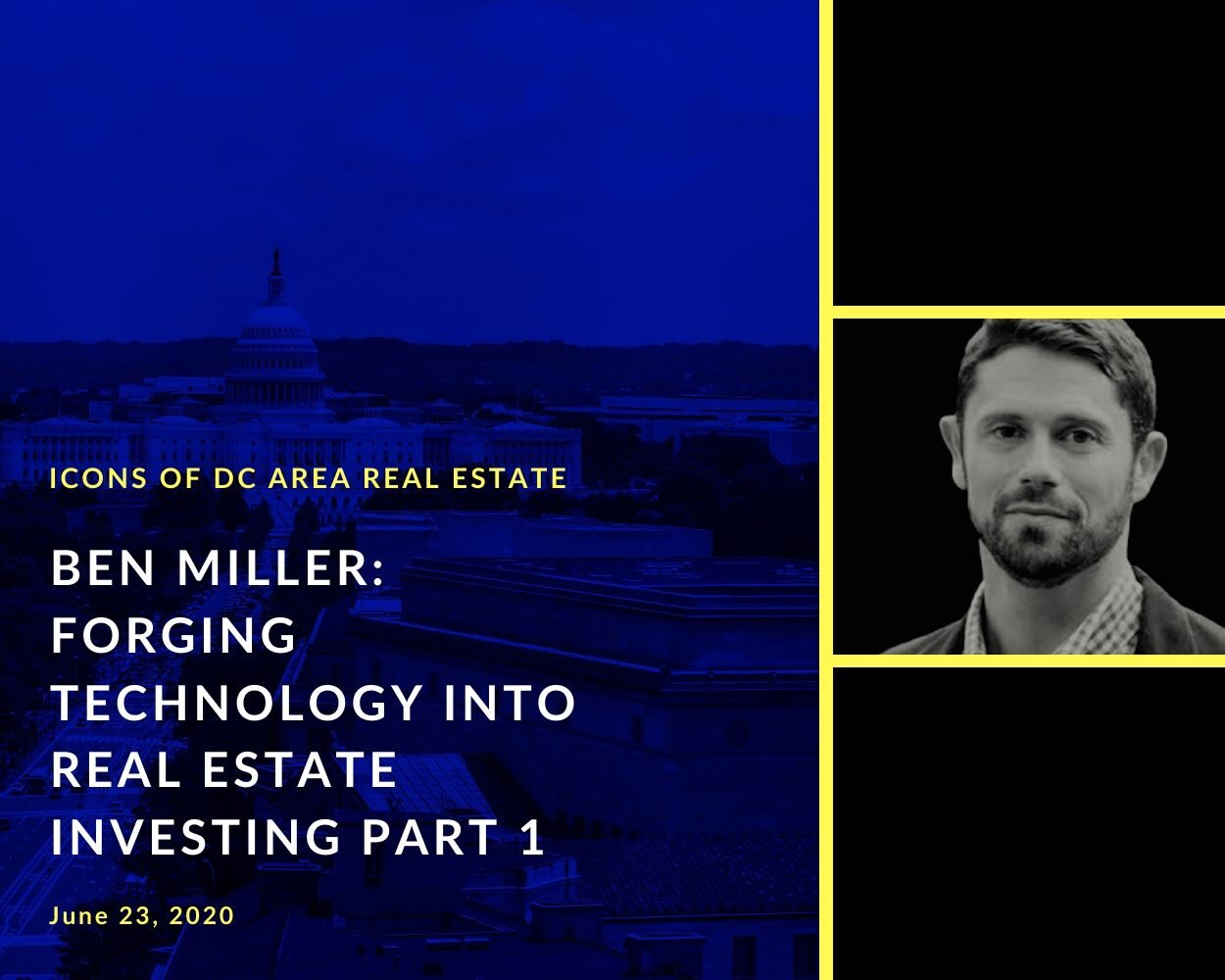

Ben Miller
Bio
Ben Miller is CEO and co-founder of Fundrise, the leading online real estate investment platform. Now with over 100,000 active individual investors and more than $1 billion worth of equity under management, Fundrise has made high-tech, low-cost real estate investing available to everyone. Founded in 2012, Fundrise is on a mission to build a better financial system by empowering the individual.
With over 20 years of experience in real estate investment and development, Ben Miller’s responsibilities cover day-to-day management, real estate investment oversight, and corporate finance, as well as setting the long-term strategy and goals for the company. Prior to Fundrise, Ben was managing partner of WestMill Capital Partners and President of Western Development Corp., one of the largest mixed-use real estate development companies in the Washington, DC metro area. A graduate of the University of Pennsylvania, he sits on the board of National Center for Children and Families.
Show Notes
Current Role
- Lead long term strategy road map and oversee asset management and senior leadership team (3:40)
- Ben Miller sees himself as the person that “pushes” at the company that takes people to their limits and drag people out of their comfort zone (4:30)
COVID 19 Issues
- Human tragedy (6:20)
- Believes crisis is more like 2008 as it will be a debt crisis, but much more serious (7:55)
- Since Yesterday (book about Great Depression) (7:25)
- Demand Shock causes deflation (7:35)
Origins
- Ben Miller grew up in DC (8:35)
- Dad is Herb Miller, one of DCs greatest landmark developers- Western Development (8:50)
- Dad is in “his own head” quite a bit (9:45)
- Went to UPenn yet by Jr. year he preferred going to work (10:20)
- Interned at Lubert Adler (11:45)
- Sharp edge view of properties (11:30)
- Alignment of interests- Win/Win relationship (11:45)
- “Organs in the game” (12:40)
- Economics Major (12:55)
- Macro understanding needs to be there to understand opportunities (13:10)
- Mother is opposite of Dad- a skeptic (14:05)
Career Arc
- Ben Miller joined Western Development
- Early on wanted to join his Dad (15:00)
- His Dad is absolutely relentless- indefatigable (15:20)
- Dad recruited him after Lubert Adler (16:10)
- Put “talented person” “over their head” and to “sink or swim” (16:45)
- Grew into role of President (17:40)
- Gallery Place (18:00)
- Redevelopment of Georgetown Park (18:15)
- Sources of money were the most distressed in 2008 (19:00)
- Left Western in 2009 to do small scale retail (19:35)
- Buy in emerging neighborhoods in DC (20:00)
- Looked in LA, Brooklyn, Detroit, etc. (20:15)
- Reversion to the mean of city redevelopment (20:40)
- New generation wanted to live in “viral” places (21:20)
- Those neighborhoods price comparable to high end neighborhoods (21:30)
- Maketto– 1351 H St. NE (22:05)
- Raise money for large scale properties available (22:30)
- Small deals needed to be from F&F and individuals (23:00)
- Problem of how money flowed into real estate (23:25)
- Wealthy people never heard of H St. NE (23:45)
- Why can’t I raise money on the internet? (24:20)
- Why go through the agony of the first raise on the internet? (25:00)
- “Meeting with the SEC- They thought it was hilarious to raise $325,000 on the internet” (25:40)
- Spent a year with the SEC to organize this opportunity with “Marty Dunn” former head of SEC to help (26:15)
- Kickstarter was an online donation- not an “investment”(26:45)
- Jobs Act of 2015 was the evolution of this drive (27:45)
- Previous law (28:50)
- Securities law in 1933-34 (29:00)
- Regulations had not evolved too much and did not anticipate the internet (29:25)
- Public offering with an Initial Public Offering or a Private Offering without any public disclosure whatsoever (29:45)
- Accredited Investor requirement (30:30)
- Previous law (28:50)
- New law
- Regulation A (31:30)
- Several exemptions that now addressed the internet (32:00)
- Marty Dunn (Referred to him by securities experts) (32:30)
- “Knew the answer” (33:20)
- He was interested in helping Ben and Fundrise as a curiosity (33:40)
Fundrise Evolution
- Fundrise began through the process of the SEC approvals (34:30)
- CTO and General Counsel joined in 2012 (35:15)
- Extraordinary abilities (35:30)
- Invent new models for securities (35:45)
- Went from “novel to invisible” (36:00)
- “Focus on the synapse. The nexus of different industries. For Fundrise it is the intersection of consumer technology, securities innovation and real estate.” (36:30)
- Consumer technology- Product people are the people who figure out how it should work (37:00)
- In RE it is what the developer does (37:45)
- Putting real estate with technology is “strange” such that few real estate people go to tech conferences (39:00)
- Fundrise did not have “product market fit” initially yet Ben kept at it relentlessly (39:45)
- Thought it was the right idea (40:25)
- Wanting to solve a problem (40:40)
- “Pushing the flywheel”- grinding the wheel initially and then it “breaks free” (41:15)
- Acts as a barrier to entry (42:00)
- Scaling the business took time (42:50)
- Create an alternative system (43:20)
- “Don’t know how hard the world is” but didn’t know better (43:45)
- Steward to the idea- don’t have an option but to move forward (44:15)
- Competitors (45:00)
- Fundrise first in 2012 (45:20)
- 2014 competition arose. (46:40)
- 2015-16- there were over 100 companies (45:30)
- By 2023 he thinks only 3 companies will be left (45:50)
- Didn’t evolve like they should have (46:05)
- Fundrise evolved every 18-24 months (46:20)
- Fundrise chases consumers’ desires (46:45)
- Raising for deals only early on
- Moved to eREIT model in 2015 (47:10)
- Look at Real Estate Private Equity model and emulated structure (47:30)
- eREIT (trademarked) (48:10)
- RE guy had a certain idea about online should work but was wrong (48:35)
- Investor is not “deal” oriented (49:20)
- Let reality tell answer, which was not “deals” but consumers wanted something else (50:00)
- Believes 2020 pandemic will wipe out competition (51:10)
- Different than any RE Equity Fund (50:30)
- Industry bias and Structural bias
- Ontogeny recapitulates Phylogeny (50:50)
- Nature of something recapitulates structure of something
- Reward middle men in fund model (51:15)
- Players involved make money in fees and promotes (51:50)
- Investors can lose while sponsor doesn’t lose much (other than time) (52:00)
- 20,000 deals- sees 19,500 conflicts of interest (53:15)
- Portfolio of Investments (54:00)
- Internet dictates how we function (54:15)
- Low fees, low costs- Race to the bottom and scale is race to the top (54:45)
- RE Private equity is fee driven and the internet does not permit this structure (55:10)
- As Fundrise gets to scale, PE funds cannot compete (55:45)
- Disrupt PE firms (55:55)
- Fundrise will be the Amazon of RE investment (56:30)
- Most RE professionals focus on IRR (57:10)
- Tech business is a different growth rate (57:50)
- Need leverage and speed to achieve higher yield (58:25)
- More of a trade to a PE firm (1:00:15)
- Leverage is the key to RE yield (58:50)
- IRR not a construct useful for investment (1:00:30)
- Investing for 30+ years (1:01:15)
- Vanguard strategy (1:01:30)
- Owned by its investors (1:02:00)
- Jack Bogle founder (1:02:20)
- Good long term investment (1:02:35)
- Investment buckets (1:03:30)
- Debt or Structured Debt- Mezz and Pref. Equity (apartments mostly) (1:04:20)
- Focus on basis of below replacement costs and the “smile” states (1:05:00)
- Development focus- more risky but no debt- all equity (1:05:45)
- Antifragile, Nassim Taleb (1:07:15)
- Barbell strategy (1:07:30)
- Grow from a shock and make you stronger (1:07:55)
- Investment strategies to prepare for “shock” (1:08:15
- In midst of crisis, sitting on cash for investment (1:08:40)
- Worst at the top of the market, but ready for opportunity in crisis (1:09:15)
Postscript
- Conversation with Tom Amos (1:10:30)
- COVID Crisis discussion (1:12:00)
- Implications on savings accounts (1:12:30)
- Consumer spending down (1:12:50)
- 30-40% of checking accounts are going up
- Fundrise offers other options for investment as an alternative to spending (1:13:30)
- Inflation hedge
- Real estate is a long term investment (1:15:00)
- Reduce the entry cost of investing in real estate (1:15:30)
- Consumer economy (1:16:10)
- Recourse Lending- How it has changed (1:16:30)

